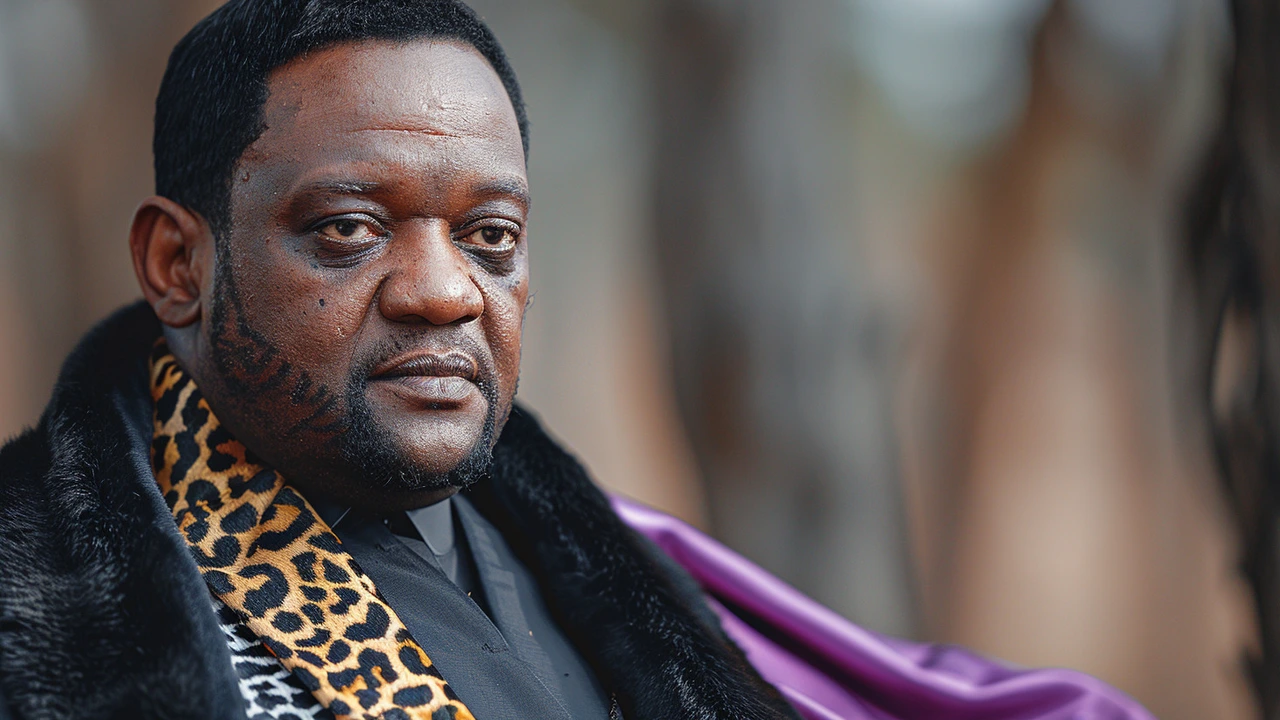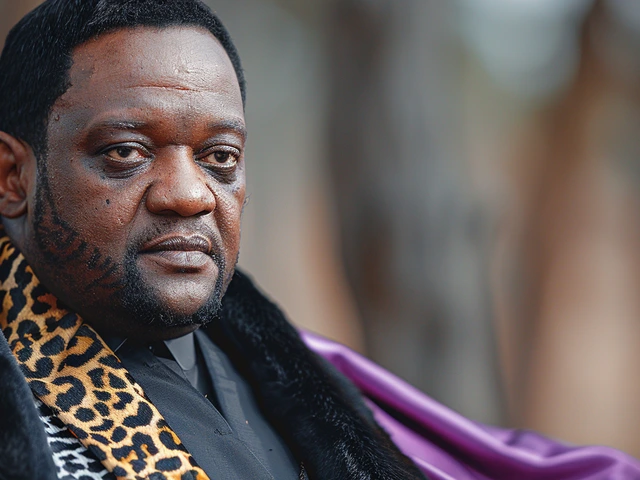
Unprecedented Call Within the Zulu Monarchy
A recent call by an uncle of King Misuzulu kaZwelithini to stop the king’s financial benefits has sparked a wave of controversy and debate within the Zulu royal family. The exact reasons behind this demand remain unclear, as the uncle in question remains unnamed, and specifics of his grievances have not been disclosed. This sudden move has brought to light the underlying tensions and conflicts within the royal family, raising significant questions about the stability and unity of the Zulu monarchy.
The Financial Implications
King Misuzulu, who ascended to the throne after the passing of his father, King Goodwill Zwelithini, in March 2021, has been receiving financial benefits as a part of his role. These benefits typically cover a range of expenses necessary for performing royal duties, including travel, security, and ceremonial obligations. The call to halt these benefits raises questions about how the king will be able to fulfill his responsibilities without adequate resources. It also opens up a broader discussion on the transparency and management of royal finances, which have historically been a sensitive issue.
Historical Context of Royal Finances
The financial arrangements for the Zulu monarchy have long been a subject of debate. Historically, the distribution of funds has been tied to both the cultural significance of the monarchy and its political influence. The process of allocating financial benefits has often been conducted with little public scrutiny, leading to occasional disputes within the royal family and among politicians. The latest call to cut off benefits could be seen as a culmination of long-standing displeasure or could reflect more immediate concerns that have yet to be publicly addressed.
Possible Motives and Reactions
While the uncle's exact motives remain speculative, various factors could be contributing to this bold request. Power dynamics within the royal family, disagreements over the direction of the monarchy, or personal grievances could all play a part. Regardless of the underlying reasons, this call has ignited a broad spectrum of reactions. Some members of the royal family and supporters of King Misuzulu may view this move as a direct challenge to his authority and an attempt to undermine his reign. Others might see it as a necessary step towards reform and accountability within the royal household.
Political and Cultural Repercussions
The potential stopping of financial benefits to King Misuzulu could have wide-reaching political and cultural repercussions. Politically, it may alter the dynamics between the Zulu monarchy and the government. Culturally, it could impact the morale and faith of the Zulu people, for whom the monarchy represents a core aspect of their heritage and identity. The call to halt these benefits could thus be seen as both a financial and symbolic attack on the king's legitimacy and role.
The unfolding situation highlights the delicate balance of maintaining traditional structures in the modern age, where issues of accountability and transparency are increasingly demanded by the public. As such, it poses a significant challenge to the royal family to navigate these complexities without further deepening internal conflicts or losing public support.
The longevity of this dispute and its resolution will undoubtedly be closely watched, not just by South Africans but also by those interested in traditional governance structures around the world. The Zulu monarchy, with its rich history and cultural significance, remains a focal point of pride and controversy, reflecting broader themes of inheritance, authority, and responsibility.
The Path Forward
If King Misuzulu's benefits were indeed to be stopped, it would necessitate adjustments and sacrifices that could reshape the functions of the royal house. The traditional ceremonies, community outreach, and other royal activities could face limitations, thus affecting the monarchy's visibility and influence. On the other hand, it might also open up opportunities for more transparent and efficient financial management, potentially fostering greater trust among the Zulu people and other stakeholders.
There remains hope that an amicable solution can be reached through dialogue and negotiation. The unity and strength of the royal family are paramount for both the legitimacy of King Misuzulu’s reign and the continued reverence of the Zulu monarchy. The involvement of other royal family members, community leaders, and political figures may be necessary to mediate a resolution that respects both tradition and evolving societal expectations.
As the discussions progress, it will be crucial for all parties involved to consider the broader implications of their decisions, not only for the present but for future generations. The legacy of the Zulu monarchy and its leaders is intricately tied to their ability to adapt and lead with integrity and foresight.
Conclusion
The recent call by King Misuzulu's uncle to stop the financial benefits has undeniably brought forth a series of pressing questions and challenges. It shines a light on the internal dynamics of the Zulu royal family and raises broader issues of financial transparency and traditional governance. The outcome of this dispute will be significant not only for the immediate stakeholders but also for the Zulu people and their cultural heritage.
As this situation evolves, the need for clear communication, understanding, and a commitment to preserving the dignity and function of the monarchy will be more critical than ever. The Zulu royal family's ability to navigate this turbulent period will largely determine its future role and influence within South Africa’s socio-political landscape. The world watches as the Zulu monarchy faces this latest test of its resilience and unity.






It's appalling that a royal family would stoop to internal power plays while the people suffer. Such entitlement must be called out and corrected.
Wake up, you blind elites!!! The royal cash flow is a front for globalist puppetry!!!
The tension within the Zulu monarchy mirrors the eternal struggle between tradition and modern accountability.
The when a lineage that once symbolized cohesion becomes mired in internal disputes, the very notion of legitimacy is tested.
Financial opacity, especially in institutions that derive authority from cultural reverence, erodes the social contract.
One could argue that the call to halt royal benefits is less a personal vendetta than a manifestation of collective yearning for transparency.
Yet, the mechanisms of power rarely yield to pure idealism without collateral damage.
The uncle's unnamed grievance could be a symptom of deeper fissures that have festered since the previous king's passing.
In examining similar dynastic challenges worldwide, we observe that reforms often arise from painful reckonings.
The Zulu people, whose identity is intertwined with the monarchy, may find themselves caught between reverence and dissent.
Moreover, the state's role in funding cultural institutions adds a layer of political complexity that cannot be ignored.
If the benefits are stripped away, the king's ability to perform ceremonial duties might diminish, affecting community cohesion.
Conversely, such a move could catalyze a more equitable redistribution of resources, aligning with democratic principles.
Philosophically, the question becomes whether authority is rooted in material support or in the symbolic weight of history.
The answer may lie in a hybrid model that honors tradition while embracing fiscal responsibility.
Ultimately, dialogue among the royal family, civil society, and the government is indispensable for navigating this crisis.
Only through sincere negotiation can the Zulu monarchy preserve its dignity and adapt to the expectations of a modern nation.
While I appreciate the philosophical depth presented, it is essential to remember the cultural significance of the Zulu institution. Any reform must balance respect for heritage with the demands of contemporary governance. I trust that measured dialogue will yield a prudent path forward.
The financial arrangements should be transparent, audited, and aligned with the kingdom's ceremonial needs. A collaborative approach can ensure both accountability and cultural preservation.
The proposition to cease the king's allowances is not merely fiscal but a theatrical display of intra-familial sabotage.
One must scrutinize the lexical choices employed by the accusers, as they often veil personal animosities behind lofty rhetoric.
The historiographic record reveals that similar power struggles have precipitated either the disintegration or the renaissance of dynastic entities.
In this scenario, the uncle’s silent motives could be interpreted as a strategic maneuver to reallocate resources toward alternative patronage networks.
Such recalibrations, however, risk destabilizing the ceremonial fabric that sustains communal identity across KwaZulu‑Natal.
Therefore, any policy shift demands rigorous analysis, stakeholder consultation, and a steadfast commitment to preserving institutional integrity.
Financial clarity can paint a brighter future for the kingdom.
I hear the pain on both sides and feel the weight of history pressing down.
It is possible to honor the king’s role while addressing legitimate concerns about money.
A compassionate mediation could bridge the divide, offering a solution that respects tradition and demands fairness.
Let us move forward together, with open hearts and clear eyes.